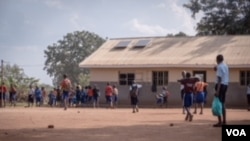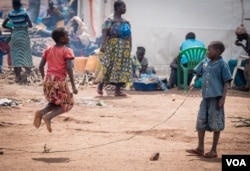In 2005, four young Congolese refugees in western Uganda opened a school for kids like themselves, separated from their families when they fled conflict in neighboring countries. Today, the school boasts about 500 students and continues to provide free education to unaccompanied refugee children or those whose families cannot afford to pay.
The school name is a combination of Congo, Burundi, Uganda, Rwanda and Sudan — the countries of origin for refugees living in western Uganda. It was named by its four teenage founders who live at the Kyangwali refugee settlement.
"So, with friends we thought, maybe we can find ways to bring new hope to our community and that's when we started creating Coburwas international youth organization to transform Africa," said Joseph Munyambaza, now 27.
The boys did manual labor to raise money. Munyambaza remembers that with the first $150 they earned, they bought textbooks for the initial 16 students.
"We used to work in the community, work for farmers and then they give us small money, which we'd use to buy text books and other materials for the most needy children," he said. "And among ourselves, we would serve as tutors. We now have our own farms, so we farm and when the crops get ready, we use the products for food."
The school also sells some crops from the farm to cover costs. Families that can afford it are encouraged to pay about $16 in fees. Outside donations help cover teacher salaries.
The first class was held under a tree that still stands in the school compound. The school now boasts four classroom blocks, serving 500 children from lower to upper primary classes.
Many residents who have lived at the Kyangwali refugee settlement for about seven or eight years say they won't return home to Congo until stability is assured.
Okoboi John Bosco, the head teacher at Coburwas, says the school has helped refugee children build new lives.
"Some of them, as early as this age of theirs now, they are talking of some early projects that they can venture in to help the community," he said. "So I see there is already a big change that has taken place in their lives, and I think the long term change is yet to come as they pursue their studies. And I believe with such initiatives within the refugee settlements, the best can be achieved from these kids."
Ten-year-old Ketrashatrawori Ibambas, who is in primary six, wants to be a doctor "because the people in this community are suffering from cholera. And they are lacking doctors, so I need also to be a doctor so that I can be able to prevent any other diseases."
The school may soon see more new students. A fresh wave of communal violence in the northeastern DRC has pushed tens of thousands of Congolese refugees into western Uganda this year. The U.N. says most of the new arrivals are women and children.





